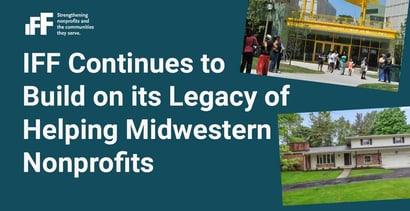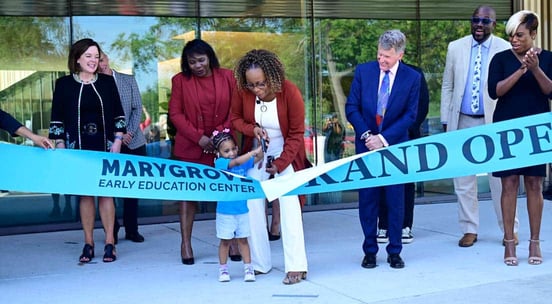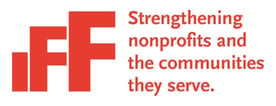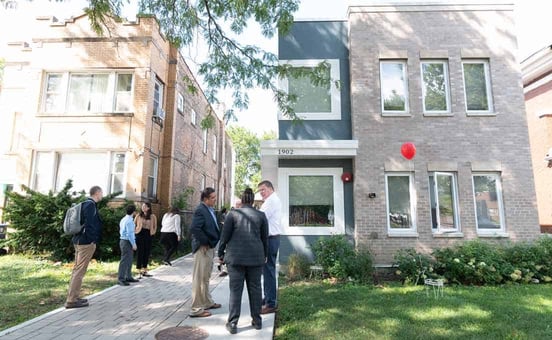
In a Nutshell: Lender and developer IFF continues to add more services to help nonprofits in the Midwest increase their impact and improve their facilities. The organization develops adaptable long-term partnerships that allow nonprofits to meet funding gaps and reach their goals. IFF recently collaborated with the City of South Bend, Indiana, to provide bridge loans for sustainability improvements also supported through city grants. IFF ultimately aims to bolster organizations that improve the nonprofit sector and disrupt inequitable systems.
In 2021, the Marygrove Early Education Center opened on the campus of former Marygrove College in Detroit. The center offers high-quality early childhood education for 150 children from newborns through 5 years old, as well as wraparound services, including speech therapy, mental health counseling, and parenting programs. The center is an anchor for an innovative birth-to-20 education model on campus.
The 28,000-square-foot space has 12 classrooms, developmental spaces, and central courtyard for light and connectivity. Paint colors and furnishings also have been thoughtfully chosen to support learning. And the entire facility is instrumental to the mission of early childhood education aligning programmatic and facilities quality.
IFF, a Midwestern-based lender, consultant, and developer, conducted a study of Detroit’s need for early childhood education programs commissioned by The Kresge Foundation. Kresge, a private national organization that works to expand opportunities in American cities through grantmaking and social investing, committed $50 million to its comprehensive Kresge Early Years for Success (KEYS) program and the redevelopment of the campus center’s construction.
IFF worked with community members, architects, early childhood education providers, and contractors to develop a space that would meet community needs and reframe the early childhood facilities conversation in Detroit.

“This project is modeled after some of the other birth-to-20 campuses [which provide education from pre-K to college] around the country and by recommendations from our early childhood needs assessments. Then, we formed deep partnerships with those organizations to try and bring those recommendations to life,” said Kirby Burkholder, IFF’s President of Core Business Solutions.
IFF has been working to expand its footprint to include more organizations across the Midwest for the last several years, and during the COVID-19 pandemic, had to quickly adjust its plans to meet nonprofits where they were. Now, it has parlayed that flexibility into forward-thinking projects that expand its reach and scope.
Another of IFF’s recent projects was the South Bend Sustainability Program in Indiana. The project is environmentally focused and designed to offset rising energy costs for nonprofits. IFF developed a partnership with the City of South Bend’s Office of Sustainability to create the Energy Assistance and Solar Savings Initiative.
Eighteen nonprofits were selected to participate in the first two cohorts. Then, each nonprofit assesses its energy efficiency and uses city and IFF grants to upgrade to more efficient facilities.
“Building a cohort model is really getting folks connected to each other and thinking thoughtfully about how to improve their operating costs, which ultimately support programs, by making these energy efficiency upgrades,” Burkholder told us.
How IFF Loans Expanded its Operations and Footprint
During the pandemic, charitable services were more necessary than ever. So, IFF has adapted its offerings to help Midwestern nonprofits improve their facilities, or at times, provide emergency services. When the pandemic hit, many nonprofits, regardless of their missions, shifted their response to provide urgently needed resources to local communities.
“We might have started off saying, ‘We’re going to do outdoor playground equipment,’ and that might have shifted to, ‘We’re going to do diapers and food,’ and then back. But the idea was, that relationship allowed us to be responsive,” said Burkholder.

One of the key lessons the IFF team learned during that challenging time was how to be nimble and meet the needs of nonprofits in the moment.
“We were administering emergency grants that were passed through from philanthropy, to home- and center-based early childhood providers, to us spending time borrower by borrower, and understanding what we could do in terms of flexibility around our loan products and services,” Burkholder told us.
The pandemic also permanently changed the way nonprofits operate and how community members access their services. Specifically, many nonprofits need technical assistance and advice in accessing grants, reconfiguring program delivery, and rethinking facilities’ needs.
IFF stepped into that advisory role to help organizations navigate the evolving landscape.
“We’re in a lot of national conversations, thinking about this idea of public/private partnerships and the other ways we can show up in this space to support the sector,” Burkholder told us.
The IFF team plans to continue to challenge itself and use feedback to leverage the organization’s scale service to meet the needs of even more nonprofits.
“If we’re paying attention, the things that people need, and the ways our programs can evolve, are right in front of us,” Burkholder said.
What Does a Healthy NPO Facility Look Like?
IFF’s primary goal is to help nonprofits improve their facilities so they can better serve their communities. So, what improvements significantly impact a nonprofit’s mission?
According to the organization, human-centered facilities make all the difference — and that term can mean different things in different sectors. In healthcare, for instance, nonprofits have been leaning into more virtual visits and remote technologies in outreach and administration. On the job development side, training centers have been shifting to less reliance on fixed spaces.
“The idea is creating a much more nimble, flexible space so programs can evolve over the course of time. That’s something we definitely saw over these last few years,” Burkholder said.
The education sector has innovated by incorporating technology and finding new ways to use buildings in different configurations. For example, the Marygrove Early Childhood Education Center evolved to respond to educational changes prompted by the pandemic through the final design phases and during construction.

In 2022, IFF approved $156.8 million through 111 loans, a 29% increase from 2021. Many of those loans focused on real estate consulting projects as well as new initiatives across the Midwest.
IFF administers Chicago’s Cultural Treasures initiative, which focuses on bolstering and preserving BIPOC arts and cultural organizations. The organization partnered with many other Chicago-based foundations to provide financial support to local nonprofits.
“We recognize that many BIPOC arts organizations are facing unprecedented challenges to their decades of leadership and resiliency right now, and that the current crises are compounding historic inequities they have faced. The funders backing this initiative hope to achieve greater equity in funding art that reflects the full diversity of American culture,” IFF states on its website.
A Mission to Prioritize Communities of Color
IFF aims to emphasize its commitment to racial equity moving forward. Specifically, the lender plans to identify organizations that have made changes to transform the nonprofit sector more broadly.
“We’ve decided to hone in on elements of our strategic plan that we felt might have been particularly impacted by the pandemic and ways in which we could accelerate even more impact,” said Kirby.
For example, IFF has recently started offering more bridge loans than ever before. This change was in response to the shortfall nonprofits said they experience between when they receive grant money and a project’s completion.

IFF also aims to prioritize system-level issues by spreading capital to more places. The organization is currently focusing on fostering connections with nonprofits outside of city centers.
“Even though we’ve worked in all of our states for some time, we really want to start to figure out what it looks like to be meaningful in rural communities. What are the specific needs of rural communities?” Burkholder told us.
To accomplish that mission, IFF opened an office in Grand Rapids in Spring 2022 and plans to open an additional office in Cleveland, while also considering what it means to have a statewide vision.
“Getting more capital in the hands of changemakers is a theme we’re doubling down on. The other is continuing to show up as a go-to resource for government stakeholders in philanthropy, and learning what that can look like,” said Kirby.
Today, IFF prioritizes more responsiveness to the needs of its nonprofit partners instead of focusing solely on loan programs. That’s because the organization understands that building thoughtful relationships can help the team stay flexible and focused as spaces, needs, and communities change.




